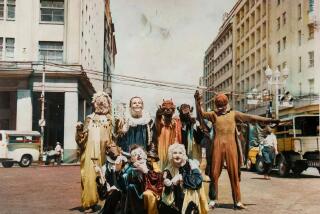Ransom Riggs lets photos narrate in ‘Talking Pictures’
Talking Pictures
Images and Messages Rescued From the Past
Ransom Riggs
It Books: 384 pp., $16.99
Ransom Riggs wrote the bestselling novel “Miss Peregrine’s Home for Peculiar Children” around the spooky found photographs that appear in the book. In “Talking Pictures,” he lets the images tell their own story.
Each one included in this photo book comes with its own words — written long ago in fountain pen, pencil or typewriter, on either back or front.
“A lot of people consider that a defaced picture,” Riggs says by phone, but he saw something different. “Lines on the back open a window into a lost world,” he explains. The heavy-set woman “raising the water level in Miami” is named Ruth; the happy drunk couple had been married less than two hours when their Polaroid was taken.
Based in Venice, Riggs earned his master’s in film production at USC. There is something not unlike film editing in the way he’s assembled these particular pictures to tell this exact story, grouping unrelated images in chapters with titles such as “Clowning Around” and “Life During Wartime.” “I did a little narrative tomfoolery,” Riggs admits. Together, the book’s arc moves from silly to sad, from public to intimate.
He estimates he went through almost half a million photographs to find the ones that appear in this book. Some were lent to him by major collectors of vernacular (amateur) photography. Others he found at thrift stores and swap meets, scanning quickly by turning boxes of pictures around backward.
“I only looked at the photo’s front if the back had something interesting written on it,” he says.
With blogs like Tumblr and the image-sharing site Pinterest, why collect these lost pictures into a print book? Riggs has blogged, but he thinks there’s something essential in the print nature of these photographs.
Although the visual digital record we create now is vast — more than 300 million photos uploaded to Facebook daily, Riggs points out that it’s “much more ephemeral than what we call ephemera: film and negatives,” he says.
More to Read
Sign up for our Book Club newsletter
Get the latest news, events and more from the Los Angeles Times Book Club, and help us get L.A. reading and talking.
You may occasionally receive promotional content from the Los Angeles Times.








